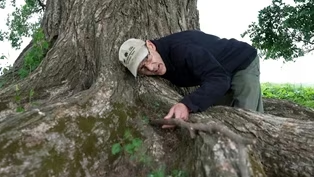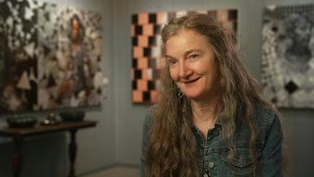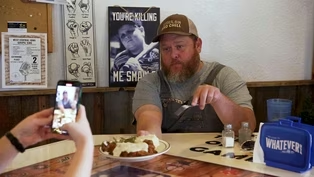
Tremble Clefs: Voices of Hope for Iowans Living with Parkinson’s
Clip: Season 3 Episode 303 | 6m 11sVideo has Closed Captions
The Tremble Clefs is a choir for people living with Parkinson’s and their loved ones.
The Tremble Clefs is a choir for people living with Parkinson’s and their loved ones. Through their voices, they find strength, connection and joy in every note.
Problems playing video? | Closed Captioning Feedback
Problems playing video? | Closed Captioning Feedback
Iowa Life is a local public television program presented by Iowa PBS

Tremble Clefs: Voices of Hope for Iowans Living with Parkinson’s
Clip: Season 3 Episode 303 | 6m 11sVideo has Closed Captions
The Tremble Clefs is a choir for people living with Parkinson’s and their loved ones. Through their voices, they find strength, connection and joy in every note.
Problems playing video? | Closed Captioning Feedback
How to Watch Iowa Life
Iowa Life is available to stream on pbs.org and the free PBS App, available on iPhone, Apple TV, Android TV, Android smartphones, Amazon Fire TV, Amazon Fire Tablet, Roku, Samsung Smart TV, and Vizio.
Providing Support for PBS.org
Learn Moreabout PBS online sponsorship♪♪ [Sun Joo Lee] Look up.
I'm here, everyone.
♪ There's a bright golden haze on the meadow.
♪ ♪ There's a — [Sun Joo Lee] The Tremble Clef is a choir for people with Parkinson's disease, caregivers and family members.
Everybody's voice is so awesome.
Right?
Jen — Oh, what a beautiful morning.
♪ [Voice in background] Oh, what a beautiful morning.
♪ [Sun Joo Lee] Parkinson's disease is a neurodegenerative movement disorder that affect motor and non-motor functioning.
♪ [Choir] I'm alive, awake, alert, ♪ ♪ enthusiastic.
Alive, awake, alert.
♪ [Sun Joo Lee] More than 70% of people with Parkinson's disease experience some voice and speech related symptoms.
♪ [Choir] I'm alive, awake, alert, enthusiastic.
♪ [Sun Joo Lee] They experience some enunciation problems, the reduced volume of speech and monotone speech.
♪ [Choir] Alive, awake, alert, enthusiastic.
♪ [Sun Joo Lee] It's not just simply singing for fun.
It's a therapy.
There are lots of goals we have to accomplish.
Mama.
Mama, stop.
Now we go.
♪ [Choir] (singing) [Sun Joo Lee] We are using therapeutic group singing as a major intervention for people with Parkinson's disease -- ♪ [Choir] (singing) [Sun Joo Lee] - to improve their respiratory, phonatory and articulatory systems.
♪ [Choir] (singing) [Sun Joo Lee] We're using the lung muscles for breathing.
We're using our larynx and vocal cords to produce the sound.
We are using our lips and jaws and the muscles on our face to articulate.
In music there are so many different kinds of elements.
We have melody, we have rhythm, we have tempo, and we have expression.
So those elements help those people to feel better, think better, move better, and also help them to be connected with others.
So, music is creating a very positive and safe place for us to communicate.
But I think it's such a beautiful thing that we can use music, especially singing.
It's very flexible, it's welcoming.
It's universal.
It's a really easy way for people to communicate, especially people with PD.
They are losing their voice to communicate.
[Sun Joo Lee] The reason we want to include the caregivers and family members is they also need this type of therapy.
Living with Parkinson's disease is not an easy journey.
[Dan Berkowitz] I was diagnosed in 2013, and I wasn't sure what to do.
But when I met with my neurologist, he said, you can still lead a pretty well, normal life.
And so, for several years, I did things like bike riding with a bike club.
[Holly Berkowitz] He was a very kind and thoughtful person.
So, I just fell head over heels for Dan.
We were very active.
We both loved the outdoors.
[Dan Berkowitz] Parkinson's made me not really an active person anymore.
I'd love to be able to go on a walk and feel like I'm not worrying about falling, but it just keeps happening.
I then think, well, it's an old person's disease.
And I say, oh, well, I'm an old person.
[Holly Berkowitz] No, you're not.
Well, you're still young.
[Dan Berkowitz] I'm older than you.
[Holly Berkowitz] A whole week.
[Dan Berkowitz] We're both 72.
Well, sometimes I imagine my voice, and it's not the same as the one I'm hearing.
[Holly Berkowitz] I feel the connection.
[Dan Berkowitz] We hold hands.
[Holly Berkowitz] We hold hands, and we pay close attention to the sound and make sure it's in tune and one whole sound.
[Dan Berkowitz] It brings us together.
I think it makes you feel a little more positive.
And the collective of the whole group singing all together.
♪ [Choir] (singing) [Sun Joo Lee] Without the fun aspect, they are not coming back.
If they do not come back to the setting, the treatment, therapy, there's no improvement.
I really encourage people to consider music therapy for treating people with Parkinson's disease.
It's a simple singing group, but it can provide more than that.
It just gives them a chance to be more socialized and helping each other so that they can continue their life with Parkinson's disease.
♪ [Choir] (singing) (applause)
Exploring Iowa’s Big Trees Through the Work of Mark Rouw
Video has Closed Captions
Clip: S3 Ep303 | 4m 8s | Visit Iowa's largest tree with Mark Rouw, a dedicated tree enthusiast, who documents trees. (4m 8s)
Inside the Studio of Rose Frantzen, Acclaimed Iowa Portrait Painter
Video has Closed Captions
Clip: S3 Ep303 | 6m 34s | Discover Rose Frantzen's oil painting process, and the stories she captures on canvas. (6m 34s)
Why the Iowa Gallivant is Eating Specials in All 99 Counties
Video has Closed Captions
Clip: S3 Ep303 | 5m 55s | Meet JayJay Goodvin, the man behind Iowa Gallivant, and learn about his travels across Iowa. (5m 55s)
Providing Support for PBS.org
Learn Moreabout PBS online sponsorshipSupport for PBS provided by:
Iowa Life is a local public television program presented by Iowa PBS
















